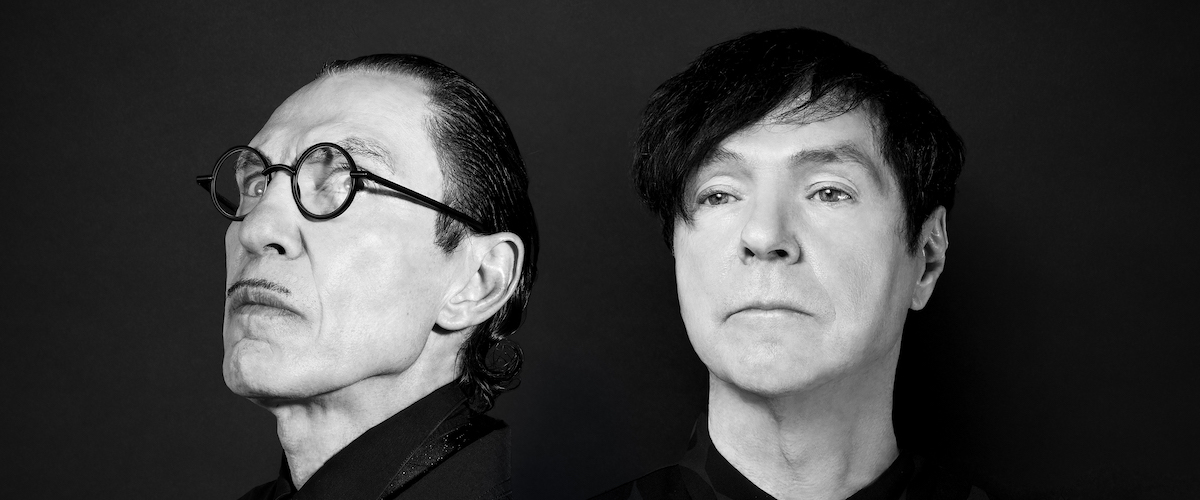
I would hardly call myself a pop music expert. Growing up on Long Island in the ’80s, I pretty much had the exact same taste as every other kid who listened to WLIR, the “alternative” radio station—The Cure, The Smiths, The Go-Gos, the usual (the latter is not a famous new-wave band from the ’80s, but probably should be).
Nonetheless, I was surprised that I had never heard of Sparks, the subject of the delightful new documentary from filmmaker (and bonafide pop music expert) Edgar Wright. I mean, apparently, this band has been around for 50 years, is highly influential, and is a favorite among actual artists like Beck, Duran Duran, and Jack Antonoff. How could I have never heard of them?
Indeed, I was so puzzled by this development that I briefly considered that The Sparks Brothers was a meta documentary—an experimental film about a made-up cult band, a mockumentary meant to deceive—essentially Spinal Tap if it never let the audience in on the joke.
But nope. Sparks are very real.
So okay, who are Sparks? They’re brothers Ron and Russell Mael, now both in their 70s, who grew up in California—Jewish, athletic, popular—and formed a rock band. The Cali part is crucial to note because people constantly assume they’re British. Indeed, there is something undeniably British about the aesthetic and vibe of Sparks. It’s hard to explain exactly why—but they fit in that sweet spot of Brits who grew up with a healthy diet of Monty Python and the Beatles: goofy, comfortable with surrealism, casually iconoclastic, and forever chasing a good melody.
On stage, the persona of the band took root right away. Older brother Ron, the keyboardist and primary songwriter, promptly grew a tiny brush mustache that, depending on how charitable you were feeling, either evoked Charlie Chaplin or Hitler. Impossibly small and wiry, he would stand behind the keyboard in a tight tank top, staring with a slightly menacing deadpan at the audience. Russell, the younger brother, was more of a traditional front man—handsome and charismatic, with great pipes. But because the Mael boys are brothers, they clearly shared a similar eccentricity, even if Ron’s was more pronounced. Point is, Russell grokked big brother Ron, and was able to mind meld with him perfectly on stage and in the band’s promotions.
They found a cult following—by definition small and passionate—especially in Europe. And they were extremely good, writing songs that were filled with clever wordplay and expressions of existential and romantic dread (reminder: Ron wrote the lyrics) that were very catchy and often ahead of their time.
So why weren’t Sparks more popular? “Ahead of their time” is one of the clues. Throughout their career, they anticipated major trends like synth pop, but usually just before they connected with a larger audience. Even more crucially, they never stuck to one genre, merely following their current passions for pop, dance, lounge, glam rock, you name it. What’s more, they were almost prohibitively prolific (when I went to purchase their greatest hits album to get a “manageable” sampling of the band, it contained a hilarious 58 songs). Finally, they were also a little too brainy and perhaps a little too weird to ever become truly mainstream.
That said, Sparks is having a moment, partly because of this very documentary and partly because they were recruited to write the soundtrack and story for Cannes Film Festival hit Annette. (On top of being musicians, the brothers are major cinephiles.) And even in their early 70s, the boys are still quite spry and—yes—still writing new music and performing, in front of increasingly worshipful crowds. (The brothers are frequently interviewed here, sitting side-by-side on straight-backed chairs, looking bemused by all the attention, not quite youthful but, let’s call it, “rock n roll old.”)
Wright is clearly a massive fan himself and he, along with talking heads that range from the artists I mentioned above to SNL’s Mike Myers, actor/musician Jason Schwartzman, and “Weird Al” Yankovic, geek out massively together. Jane Wiedlin, from The Go-Gos, is also interviewed and she has a real connection to the band: She briefly dated Russell and even collaborated on a song. (Indeed, when the film shared the video of that collaboration—”Cool Places”—I finally had my aha moment. Hey, I know that song!).
Wright digs pretty deep into the Sparks catalogue, history, and career ups and down, but one suspects he could’ve gone way deeper. (The film clocks in at a hefty two hours and 20 minutes, but somewhere, I’m guessing there’s a director’s cut that is twice as long.) But Wright’s films tend to be fast-paced and almost compulsively entertaining and, in the end, his instincts as a filmmaker won out. I do wish there was a bit more about the Mael brothers’ personal lives—have they been married? do they have kids? The film gives us no clue (clearly by design; some winking mystery is baked into the mix with Sparks) although it does delve quite deeply into the special bond between the two brothers. Russell was the showman who got all the girls. Ron was the brooding genius. One suspects that both slightly envied the other.
The Sparks Brothers film is smart, funny, infectiously weird, a little geeky, a little too long, a little niche, and consistently entertaining. Sound familiar?
The Sparks Brothers is playing on VOD. Check your local provider.
